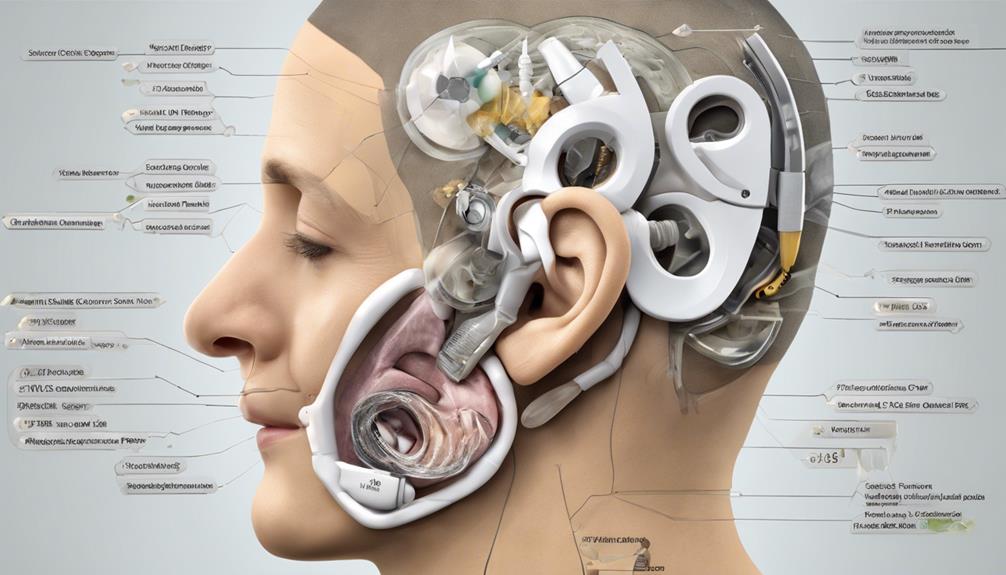Starting to grasp the costs associated with cochlear implants is akin to navigating a complex maze, where each turn reveals a new layer of information to understand.
As we unravel the intricate web of expenses tied to cochlear implants, one must consider not only the upfront figures but also the hidden variables that can significantly impact the final bill.
Stay with us as we shed light on the lesser-known aspects that could shape your understanding of this crucial topic.
Key Takeaways
- Average cochlear implant costs range from $50,000 to $100,000.
- Insurance coverage, location, and surgical center choice impact final expenses.
- Medicare typically covers 80%, leaving 20% for beneficiaries.
- Assistance programs exist to support individuals with insufficient insurance coverage.
Understanding Cochlear Implant Expenses
Understanding the expenses associated with cochlear implants is essential for individuals considering this hearing solution.
The costs of cochlear implants can vary significantly, ranging from $50,000 to $100,000 on average. Factors such as location, insurance coverage, and in-network providers play a crucial role in determining the final cost.
Medicare typically covers 80% of the costs for eligible candidates, leaving beneficiaries responsible for the remaining 20% along with any deductibles, coinsurance, and copays. For those without adequate insurance coverage, various assistance programs exist to help alleviate the financial burden.
It's important to consider the implications of location and surgical center choice on overall costs, as these factors can influence the final expenses significantly. Choosing in-network providers can also lead to more favorable pricing arrangements.
Average Cost Breakdown of Implants

The breakdown of costs for cochlear implants includes expenses associated with surgery, initial care, and ongoing maintenance. When considering the average cost breakdown of implants, patients should be aware of the following key points:
- Insurance Coverage: Patients should review their health insurance policies to understand what portion of the cochlear implant costs will be covered. Different insurance plans may have varying degrees of coverage for these medical devices.
- Assistance Programs: For individuals without adequate insurance coverage, there are assistance programs available to help offset the costs of cochlear implants. These programs aim to make this life-changing technology more accessible to those in need.
- Deductibles and Copays: Depending on the patient's insurance plan, they may be responsible for covering deductibles, coinsurance, or copays related to the cochlear implant procedure. Understanding these out-of-pocket expenses is crucial for financial planning.
Factors Influencing Implant Costs
Factors such as location, choice of surgical center, and insurance coverage play significant roles in determining the costs associated with cochlear implants. Price variations across different regions in the country can impact the overall cost of the procedure.
Additionally, the surgeon's in-network status with your insurance provider can influence the final cost of cochlear implant surgery. It's essential for patients to proactively reach out to their health insurance provider to understand coverage details, including benefits, coinsurance, copays, and deductibles.
Coverage Options for Implant Expenses

When considering coverage options for cochlear implant expenses, it's essential to explore the various assistance programs available. Understanding insurance details and benefits is crucial to navigating coverage for cochlear implant costs. Here are some key points to consider:
- Medicare typically covers 80% of cochlear implant costs for eligible candidates.
- Private insurance, Medicaid, and Veterans Administration help cover over 90% of cochlear implant expenses.
- Costs can vary based on insurance coverage, location, and in-network providers.
It's important to note that patients may still need to cover coinsurance, copays, and deductibles, but assistance programs exist to provide additional support. Eligibility criteria for these programs may vary, so it's advisable to research and inquire about specific coverage options for hearing implants.
Financial Assistance Opportunities
Exploring financial assistance opportunities can be crucial for individuals navigating the costs of cochlear implants, especially given the significant financial burden these procedures can pose without adequate coverage. Various avenues exist to help alleviate the financial strain associated with cochlear implant surgery. Below is a table outlining some key sources of financial assistance for individuals seeking cochlear implants:
| Source | Description | Benefits |
|---|---|---|
| Manufacturers | Offer payment assistance programs to offset costs | Reduced financial burden |
| Non-profit organizations | Provide financial assistance for cochlear implants | Support for those in need |
| Insurance companies | Coverage significantly reduces out-of-pocket costs | Financial relief for policyholders |
| Financing options | Available through manufacturers and non-profit organizations | Flexible payment plans for affordability |
Frequently Asked Questions
Will Insurance Cover a Cochlear Implant?
Insurance coverage for cochlear implants varies, with Medicare often covering 80% for eligible candidates. Private insurance plans can also provide coverage, reducing out-of-pocket costs. Medicaid coverage varies by state, with some offering it for children and certain adults.
Veterans Affairs offers coverage for eligible veterans. There are also payment assistance programs and non-profits that help individuals with cochlear implant costs.
How Much Does It Cost to Get a Cochlear Implant With Medicare?
Getting a cochlear implant with Medicare typically costs 20% of the total expenses, as Medicare usually covers 80% for eligible candidates. This means beneficiaries are responsible for the remaining portion.
Supplement plans can help reduce out-of-pocket costs, while coverage levels may vary with Medicare Advantage plans. Private insurance, Medicaid, and Veterans Administration often assist with over 90% of the costs for cochlear implants, making it more affordable for many individuals.
How Much Does Bilateral Cochlear Implant Surgery Cost?
Bilateral cochlear implant surgery costs can range from $100,000 to $200,000 for both ears. This price typically covers the surgical procedure, follow-up care, and device maintenance. Patients may also have additional expenses like coinsurance, copays, deductibles, and ongoing rehabilitation costs.
Insurance coverage for bilateral cochlear implants varies, with some plans offering reduced costs for both ears. It's crucial to inquire about coverage details and explore financial assistance options.
What Is the Cost of Cochlear Implant Speech Processor?
The cost of a cochlear implant speech processor typically ranges from $7,000 to $10,000. This expense is commonly covered in the overall costs of cochlear implant surgery.
The speech processor is an external device that captures and processes sound for transmission to the internal implant.
It's important for patients to check with their insurance provider to understand what costs are covered for the cochlear implant speech processor, potentially reducing their out-of-pocket expenses.
Conclusion
In conclusion, the cost of cochlear implants can be a significant financial commitment, but with the right insurance coverage and financial assistance options, it's manageable.
The average cost breakdown and factors influencing prices provide valuable insights for individuals considering this life-changing technology.
Overall, the journey to obtaining a cochlear implant may seem daunting, but the benefits it can bring are truly priceless, making it a worthwhile investment in one's quality of life.










